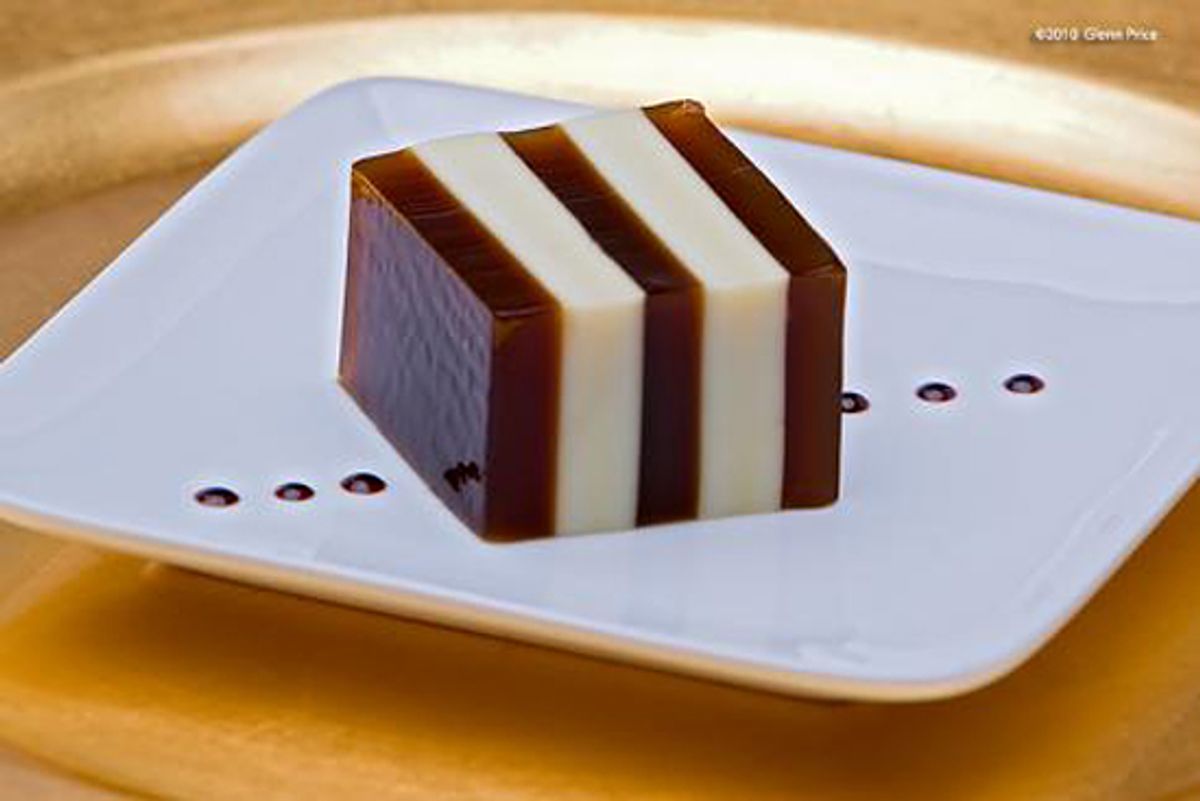My gateway booze in college wasn't Bud, but Kahlua. By sophomore year, coffee was pulsing through my veins and needed to be replenished at a rate of seven cups a day. By senior year, I was running with a fast crew of night owls who'd put on a pot to brew at midnight. We liked to tell ourselves we were studying.
Since then, I've gotten my habit under control and straightened out my life, but I still have a huge soft spot for coffee-flavored sweets. But, for all its popularity, coffee isn't exploited as a flavoring as much as one would think, at least not in the U.S. In Canada, the Coffee Crisp -- flaky wafers sandwiched with a sugary coffee-flavored filling and coated with chocolate -- can almost be considered the national candy bar. When I was living there, I also saw coffee-flavored chewing gum, though I have to admit that goes too far even for me: Doesn't one chew gum to get rid of coffee breath?
But some of the most unusual and tasty coffee-flavored confections come from Japan. Coffee jelly -- essentially sweet black coffee set with gelatin -- is a case in point. It's one of those amazingly simple, yet out-of-left-field concoctions that make one think, "Wow, I wish I'd thought of that!"
Since good ideas tend to spread, variants of this treat have migrated to other traditionally coffee-free regions of Asia, and even to Asian enclaves in the U.S. My favorite coffee jelly came from a Hong Kong-style dim sum restaurant in Southern California, where it was misleadingly labeled "layered coffee cake" on the menu: It consisted of layered coffee and coconut-flavored gelatin cut into pretty striped cubes. It was cool and smooth, firm but melting, and the coconut added creaminess and flavor.
I must have scarfed down three or four of those pretty little striped cubes during that brunch, and I've been promising to re-create that "coffee cake" ever since. My version pays tribute to Vietnamese-style coffee (strong, fresh French roast swirled with sweetened condensed milk), and features layers of coffee- and condensed-milk jelly. (It's worth noting that in parts of Asia sweetened condensed milk isn't seen as a mere utilitarian mystery ingredient, but as a condiment in its own right -- and deservedly so.)
At dim sum meals, sweet and savory items are traditionally served together, and diners can choose to eat the available offerings in any order they please. But the coffee jelly also works nicely as a light stand-alone dessert, garnished with a touch of chocolate sauce.
Of course, this garnish isn't traditionally Chinese -- but neither is the jelly itself.
Coffee and Cream Jelly
Ingredients
For the coffee jelly
- ¼ cup sugar
- 2 envelopes unflavored gelatin
- 2 cups fresh hot coffee (use decaf if serving to children or those sensitive to caffeine)
- ½ cup cold water
- ½ cup boiling water
For the condensed milk jelly
- 1 (14-ounce) can sweetened condensed milk (NOT evaporated milk)
- 2 envelopes unflavored gelatin
- ½ cup cold water
- ½ cup boiling water
Directions
Coffee jelly
- Pour the cold water into a large mixing bowl. Sprinkle the gelatin over the water and stir to combine. Break up any clumps of gelatin and ensure that all of the gelatin is moistened.
- Pour the boiling water over the moistened gelatin and stir until the gelatin is completely dissolved.
- Add the hot coffee and sugar. Stir until the sugar is dissolved. Set mixture aside (do not refrigerate; you want the gelatin to remain liquid).
Condensed milk jelly
- Pour the cold water into a large mixing bowl. Sprinkle the gelatin over the water and stir to combine. Break up any clumps of gelatin and ensure that all of the gelatin is moistened.
- Pour the boiling water over the moistened gelatin and stir until the gelatin is completely dissolved.
- Stir in the condensed milk. Set mixture aside (again, it needs to remain liquid, so don't refrigerate it).
Assembly
- Pour 1 cup of the coffee jelly mixture into a 9-by-5-inch loaf pan. Refrigerate until the jelly has partially set: It should be solid, but still sticky when touched. (This is the only remotely tricky thing about this recipe: If the layer is fully set, the next layer won't stick to it and the layers will slide apart when the jelly is unmolded or sliced. If the layer is not sufficiently set, it will collapse when the next layer of jelly is added, messing up that neat geometric effect you're going for.)
- When the coffee layer is set but sticky, carefully pour 1 cup of the condensed milk jelly on top of it.
- When the condensed milk layer is set but sticky (it sets faster than the coffee layers), pour 1 cup of the coffee jelly over it to form the next coffee layer.
- Repeat steps 2 and 3 to form the fourth and fifth layers.
- When the top layer is set, the jelly is ready. To unmold, sit the pan in a container of hot water for about 30 seconds. Remove, and run a knife along the edges to loosen the jelly. Invert the mold over a cutting board.
- Cut the jelly into blocks or slices as desired. For best results, dip the knife you use in hot water and wipe it clean between cuts.
- Plate and garnish with chocolate sauce, if desired.



Shares